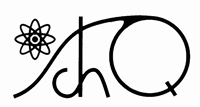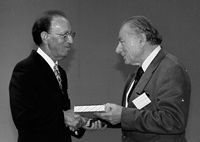
Chemistry International
Vol. 22, No. 5, September 2000
2000, Vol. 22
No. 5 (September)
..Chemistry in Chile
..IUPAC Prize
..Air Quality in Denmark
..Highlights from the Web
..Reports from Symposia
..New Projects
..News and Notices
..Awards and Prizes
..New Books
..Provisional Recommendations
..Reports from Commissions
..Conference
Announcements
..Conference Calendar
Download the September
issue in pdf format.
(463K)
Chemistry International
Vol. 22, No. 5
September 2000
An Outlook for Chemistry in Chile in 2000 (cont')
Summary
History
Research
Human Resources
Graduate Programs
The Chilean Chemical Society (SChQ)
Closing Remarks
ReferencesFinancial support and human resources are the bases for scientific and technological development. It is internationally accepted that the number of scientists and engineers is an important parameter to measure the status of science and technology. In Chile, the number of researchers, scientists, and engineers is low whether it is expressed as an absolute number or as a fraction of the total population. Chile has about 1.2 scientific professionals per thousand inhabitants in contrast to developed countries, where this number varies between 4 and 9 per thousand. Most of these researchers, scientists, and engineers are in universities (about 70%), and the remainder are distributed in institutes (nearly 20%), and industry (10%). The total number of scientific professionals working in Chilean universities is about 4 400, with nearly 400 of them devoted to chemical research.
Chile has five graduate programs [5] leading to a doctorate in chemistry; they are located at the Universidad de Chile (initiated in 1973), Pontificia Universidad Católica de Chile (1973), Universidad de Concepción (1975), Universidad de Santiago (1983), and Universidad Católica de Valparaíso (1983). These programs have similar admission requirements, which include the degree of Licenciado en Química or equivalent, two letters of recommendation, and an interview. To complete a doctoral program successfully, a student must pass 6—8 courses, a qualification examination in English, and a thesis presentation. The most important activity is the thesis, which must be an important and original contribution to the development of an area of chemistry. The time required to complete the thesis varies between two and four years. Currently, all five Chilean doctoral programs are accredited by CONICYT, and financial support, via fellowships, comes from CONICYT, the Ministry of Education through the Improvement of High Teaching Quality Program (MECESUP), Fundación Andes, and the universities. Since 1968, about 150 young Chilean scientists have received doctoral degrees in chemistry. Most of them have taken academic jobs; fewer than 20% have gone to industry.
The Chilean Chemical Society (SChQ)
The Chilean Chemical Society (SChQ) was founded in 1946 to promote all areas of chemistry, as well as to advise educational and government authorities. The society is organized by Regions (Regionales) and Divisions (Divisiones). Regions are centers that comprise members within a single city; the five Regions are based in La Serena, Valparaíso, Santiago, Concepción, and Valdivia. Divisions, as in other chemical societies, group people with interests in a particular branch of chemistry. Each Division organizes periodic meetings, seminars, and workshops.
Prof. Ernest Eliel (right), on the occasion of his nomination as an Honorary Member of the Chilean Chemical Society, receiving the award from Prof. Guillermo Contreras, President of the Society, at the 23rd Chilean National Meeting held in Valdivia, 24-27 November 1999. The Divisions currently include Catalysis and Adsorption, Macromolecules, Chemical Education, Natural Products, Inorganic Chemistry, Analytical Chemistry, and Environmental Chemistry. Each Region and Division has its own President and Council, elected by its members. Membership for both is open to all chemists in the Society, which now has about 400 members.
The SChQ organizes and supports a broad range of activities to enhance public awareness and promote a positive image of chemistry through a strong program of public lectures, public symposia, exhibitions, posters, and booklets. Every year, the Chemical Education Division organizes the Olimpiadas de Química (Chemistry Contests) aimed at enhancing interest in chemistry among high school students. Students from all over the country participate in this event. The winners later compete in the Olimpiadas Iberoamericanas de Química (Iberoamerican Contests), which are held in a different Iberoamerican country each year.
The national meeting of the Society is the Jornadas Chilenas de Química, which takes place every two years and includes academic and industrial chemists from all over the country. Graduate students play an important role at these meetings, where they have the opportunity to report and discuss their research results with the national chemical community.
The Society publishes the Boletín de la Sociedad Chilena de Química, which is a quarterly journal reporting original research in all areas of chemistry. Its first volume was published in March 1950, and its current volume is No. 45, whose first number was published in March 2000. The Boletín is indexed in Current Contents and the Science Citation Index, and it is currently one of the Iberoamerican journals with a high relative impact factor—quite an accomplishment for a Society as small as the SChQ. The Boletín is sent to all members of the Society. Currently, the SChQ web site is at http://www.schq.cl. At present, the Chilean Chemical Society participates actively in several international scientific organizations, including the International Council for Science (ICSU), Federación Latinoamericana de Asociaciones Químicas (FLAQ), Pacific Basin Societies (PBS), and IUPAC. The SChQ maintains permanent exchange programs with the American Chemical Society (ACS), as well.
The most important goals of the SChQ are to enhance awareness of the importance of science in general and of chemistry in particular in everyday life. This message must be brought home at three different levels. First, and most important, it must reach the younger generation of Chileans, represented by pre-high school students. Second, government authorities must also be included in the scheme. Finally, the public at large needs to accept the inherent need for and benefit of science in the contemporary world. The general population also needs to consider large numbers of scientists and institutions doing research as a reason for national pride and not as a bothersome liability. Many problems and obstacles remain, but the achievement of the national chemical community in the last 50 years leads us to regard the future of chemistry in Chile with sound optimism.
the book shelfWant to Know More? Science in Chile Chile Science Newslist Inigo's Science portal Chemistry in . . . Africa Argentina Brazil Chile Czech Republic Cuba Poland Slovenia References
1. T. González Abuter. Sociedad Chilena de Química 50 Años al Servicio de la Ciencia, 1946—1996. Sociedad Chilena de Química (1996).
2. C. Macilwain. Nature, Supplement to Vol. 398, No.6726, 1 April 1999.
3. Indicadores Científicos y Tecnológicos, Enrique Dellacasa (Ed.), CONICYT (1998).
4. Science in Latin America in Science 267, 808—827(1995).
5. Programas de Postgrado en Química de las Universidades Chilenas, Guillermo González (Ed.), Sociedad Chilena de Química (1994).
This article was contributed by Prof. Eduardo J. Delgado (Department of Physical Chemistry, Faculty of Chemical Sciences, Casilla 160-C, Universidad de Concepción, Concepción, Chile; E-mail: [email protected]), Secretary of the Chilean Chemical Society.
News
and Notices - Organizations and People
- Standing Committees
Divisions
- Projects - Reports
- Publications - Symposia
- AMP - Links
Page last modified 20 August 2000.
Copyright © 1997-2000 International Union of Pure and Applied Chemistry.
Questions or comments about IUPAC, please
contact the Secretariat.
Questions regarding the website, please contact [email protected]


